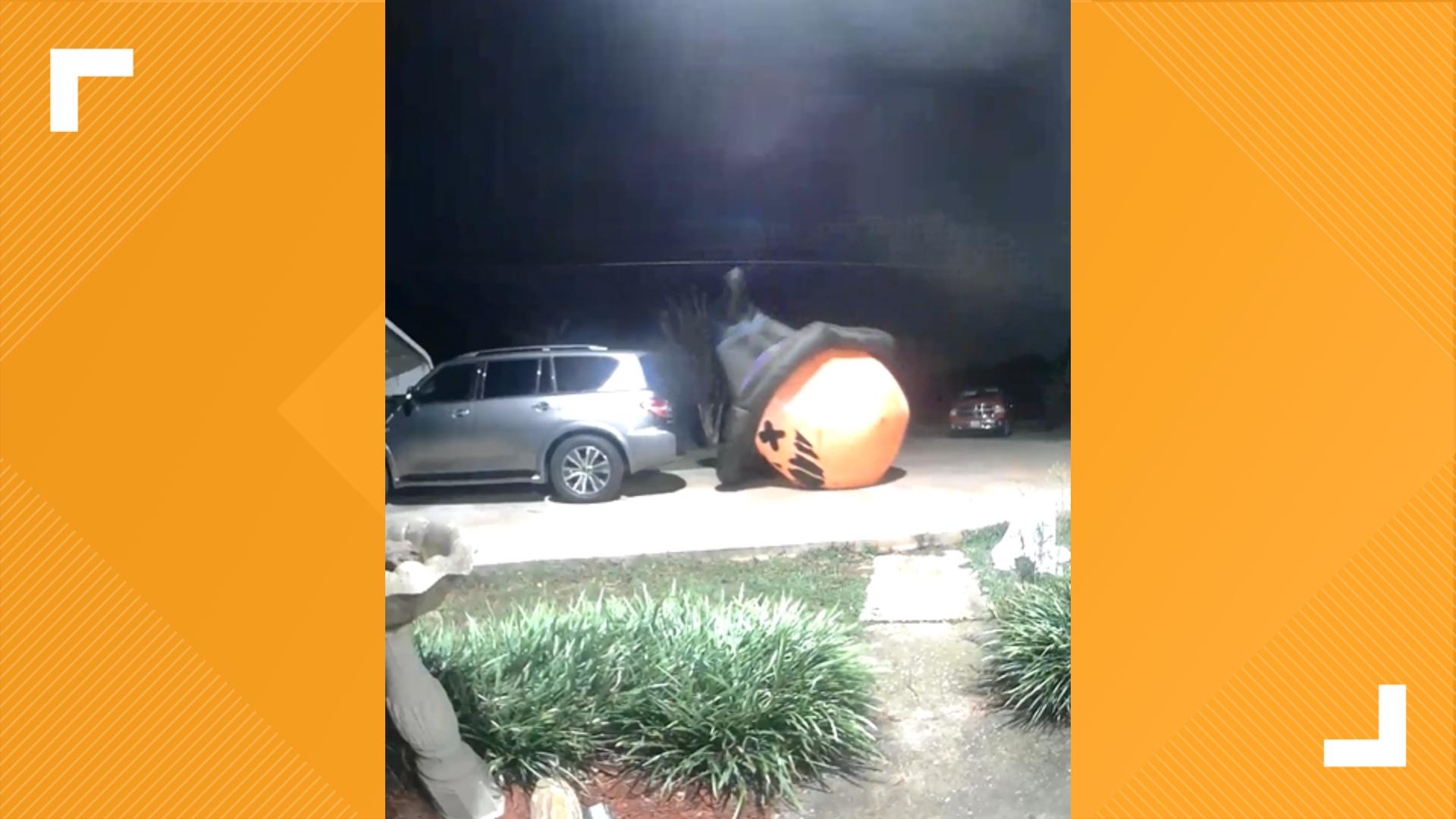TYLER, Texas — Thanksgiving is a special holiday that brings together family and friends, but it also can carry some hazards for pets.
Holiday food needs to be kept away from pets, and pet owners who travel need to either transport their pets safely or find safe accommodations for them at home.
The American Veterinary Medical Association (AVMA) recommends following these tips to keep your pets healthy and safe during the holiday:
POISON RISKS
Overindulging in the family feast can be unhealthy for humans, but even worse for pets: Fatty foods are hard for animals to digest. Poultry bones can damage your pet’s digestive tract and nd holiday sweets can contain ingredients that are poisonous to pets.
Keep the feast on the table — not under it. Eating turkey or turkey skin – sometimes even a small amount – can cause a life-threatening condition in pets known as pancreatitis. Fatty foods are hard for animals to digest, and many foods that are healthy for people are poisonous to pets – including onions, raisins and grapes. If you want to share a Thanksgiving treat with your pet, make or buy a treat that is made just for them.
No pie or other desserts for your pooch. Chocolate can be harmful for pets, even though many dogs find it tempting and will sniff it out and eat it. The artificial sweetener called xylitol – commonly used in gum and sugar-free baked goods – also can be deadly if consumed by dogs or cats.
Yeast dough can cause problems for pets, including painful gas and potentially dangerous bloating.
Put the trash away where your pets can’t find it. A turkey carcass sitting out on the carving table, or left in a trash container that is open or easily opened, could be deadly to your family pet. Dispose of turkey carcasses and bones – and anything used to wrap or tie the meat, such as strings, bags and packaging – in a covered, tightly secured trash bag placed in a closed trash container outdoors (or behind a closed, locked door).
According to the ASPCA, here's another list of foods to avoid giving your pet(s):
Alcohol - Alcoholic beverages and food products containing alcohol can cause vomiting, diarrhea, decreased coordination, central nervous system depression, difficulty breathing, tremors, abnormal blood acidity, coma and even death. Under no circumstances should your pet be given any alcohol. If you suspect that your pet has ingested alcohol, contact your veterinarian or the ASPCA Animal Poison Control Center immediately.
Avocado - Avocado is primarily a problem for birds, rabbits, donkeys, horses, and ruminants including sheep and goats. The biggest concern is for cardiovascular damage and death in birds. Horses, donkeys and ruminants frequently get swollen, edematous head and neck.
Chocolate, Coffee and Caffeine - These products all contain substances called methylxanthines, which are found in cacao seeds, the fruit of the plant used to make coffee, and in the nuts of an extract used in some sodas. When ingested by pets, methylxanthines can cause vomiting and diarrhea, panting, excessive thirst and urination, hyperactivity, abnormal heart rhythm, tremors, seizures and even death. Note that darker chocolate is more dangerous than milk chocolate. White chocolate has the lowest level of methylxanthines, while baking chocolate contains the highest.
Citrus - The stems, leaves, peels, fruit and seeds of citrus plants contain varying amounts of citric acid, essential oils that can cause irritation and possibly even central nervous system depression if ingested in significant amounts. Small doses, such as eating the fruit, are not likely to present problems beyond minor stomach upset.
Coconut and Coconut Oil - When ingested in small amounts, coconut and coconut-based products are not likely to cause serious harm to your pet. The flesh and milk of fresh coconuts do contain oils that may cause stomach upset, loose stools or diarrhea. Because of this, we encourage you to use caution when offering your pets these foods. Coconut water is high in potassium and should not be given to your pet.
Grapes and Raisins - Although the toxic substance within grapes and raisins is unknown, these fruits can cause kidney failure. Until more information is known about the toxic substance, it is best to avoid feeding grapes and raisins to dogs.
Macadamia Nuts - Macadamia nuts can cause weakness, depression, vomiting, tremors and hyperthermia in dogs. Signs usually appear within 12 hours of ingestion and can last approximately 12 to 48 hours.
Milk and Dairy - Because pets do not possess significant amounts of lactase (the enzyme that breaks down lactose in milk), milk and other dairy-based products cause them diarrhea or other digestive upset.
Nuts - Nuts, including almonds, pecans, and walnuts, contain high amounts of oils and fats. The fats can cause vomiting and diarrhea, and potentially pancreatitis in pets.
Onions, Garlic, Chives - These vegetables and herbs can cause gastrointestinal irritation and could lead to red blood cell damage. Although cats are more susceptible, dogs are also at risk if a large enough amount is consumed. Toxicity is normally diagnosed through history, clinical signs and microscopic confirmation of Heinz bodies.
Raw/Undercooked Meat, Eggs and Bones - Raw meat and raw eggs can contain bacteria such as Salmonella and E. coli that can be harmful to pets and humans. Raw eggs contain an enzyme called avidin that decreases the absorption of biotin (a B vitamin), which can lead to skin and coat problems. Feeding your pet raw bones may seem like a natural and healthy option that might occur if your pet lived in the wild. However, this can be very dangerous for a domestic pet, who might choke on bones, or sustain a grave injury should the bone splinter and become lodged in or puncture your pet’s digestive tract.
Salt and Salty Snack Foods - Large amounts of salt can produce excessive thirst and urination, or even sodium ion poisoning in pets. Signs that your pet may have eaten too many salty foods include vomiting, diarrhea, depression, tremors, elevated body temperature, seizures and even death. As such, we encourage you to avoid feeding salt-heavy snacks like potato chips, pretzels, and salted popcorn to your pets.
Xylitol - Xylitol is used as a sweetener in many products, including gum, candy, baked goods and toothpaste. It can cause insulin release in most species, which can lead to liver failure. The increase in insulin leads to hypoglycemia (lowered sugar levels). Initial signs of toxicosis include vomiting, lethargy and loss of coordination. Signs can progress to seizures. Elevated liver enzymes and liver failure can be seen within a few days.
Yeast Dough - Yeast dough can rise and cause gas to accumulate in your pet’s digestive system. This can be painful and can cause the stomach to bloat, and potentially twist, becoming a life threatening emergency. The yeast produce ethanol as a by-product and a dog ingesting raw bread dough can become drunk (see alcohol).
"A few small boneless pieces of cooked turkey, a taste of mashed potato or even a lick of pumpkin pie shouldn’t pose a problem," the ASPCA said. "However, don't allow your pets to overindulge, as they could wind up with a case of stomach upset, diarrhea or even worse—an inflammatory condition of the pancreas known as pancreatitis. In fact, it’s best keep pets on their regular diets during the holidays."
The AVMA and the ASPCA attributed to this article.



